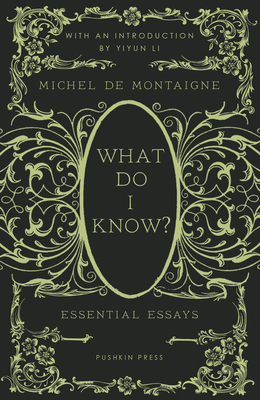
A fresh new translation of Michel de Montaigne’s most profound, searching essays, with an introduction from Yiyun Li, author of The Book of Goose This gift-worthy collection of 16 essays by “the father of the essay” is a short, accessible introduction to his work, offering a fascinating glimpse inside a great Renaissance mind “I myself am the subject of my book.” So wrote Montaigne in the introductory note to his Essays, the book that marked the birth of the modern essay form. In works of probing intelligence and idiosyncratic observation, Montaigne moved from intimate personal observation to roving theories of the conduct of kings and cannibals, the effects of sorrow and fear, and the fallibility of human memory and judgement. This new selection of Montaigne’s 16 most ingenious essays appears in a lucid new translation by the prize-winning David Coward. What Do I Know? gives the modern reader profound insight into a great Renaissance mind. What Do I Know? is divided into 3 sections and MONTAIGNE ON MONTAIGNE On Sorrow, On how our Actions are to be judged by the Intention, On Idling, On Liars, That we should not be considered happy until we are dead ON THE PURSUIT OF REASON On Fear, To tell true from false, it is folly to rely on our own capacities, How we can cry and laugh at the same thing, On Solitude, On the Uncertainty of our Judgement, On Drunkenness ON GOVERNANCE AND GOVERNORS On Cannibals, On the Inequality that exists between us, On Sleep, On our lease of life, On Carriages
Author

Michel Eyquem de Montaigne (1532-1592) was one of the most influential writers of the French Renaissance. Montaigne is known for popularizing the essay as a literary genre. He became famous for his effortless ability to merge serious intellectual speculation with casual anecdotes and autobiography—and his massive volume Essais (translated literally as "Attempts") contains, to this day, some of the most widely influential essays ever written. Montaigne had a direct influence on writers the world over, from William Shakespeare to René Descartes, from Ralph Waldo Emerson to Stephan Zweig, from Friedrich Nietzsche to Jean-Jacques Rousseau. He was a conservative and earnest Catholic but, as a result of his anti-dogmatic cast of mind, he is considered the father, alongside his contemporary and intimate friend Étienne de La Boétie, of the "anti-conformist" tradition in French literature. In his own time, Montaigne was admired more as a statesman then as an author. The tendency in his essays to digress into anecdotes and personal ruminations was seen as detrimental to proper style rather than as an innovation, and his declaration that, "I am myself the matter of my book", was viewed by his contemporaries as self-indulgent. In time, however, Montaigne would be recognized as embodying, perhaps better than any other author of his time, the spirit of freely entertaining doubt which began to emerge at that time. He is most famously known for his skeptical remark, "Que sais-je?" ("What do I know?"). Remarkably modern even to readers today, Montaigne's attempt to examine the world through the lens of the only thing he can depend on implicitly—his own judgment—makes him more accessible to modern readers than any other author of the Renaissance. Much of modern literary nonfiction has found inspiration in Montaigne, and writers of all kinds continue to read him for his masterful balance of intellectual knowledge and personal storytelling.